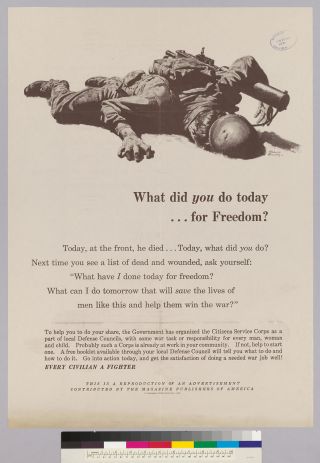Motivation
Fallen Soldiers, Declining Support for War
How do casualties of war shape our support for conflict?
Posted May 25, 2012
War memorials generally celebrate the fallen – the soldiers or the victims of the tragedy of war. Rarely do we commemorate wars themselves with grandiose monuments. Public attitudes toward war reflect this tension in frequent (but rarely universal) support for the objectives of armed conflict but an intolerance of the loss of soldiers’ lives. With Memorial Day approaching, it seems an appropriate time to reflect on why we support war. While much has been said about war and why we support or oppose it, I focus on one narrow cause of public opinion toward war: casualties.
As should be no surprise, support for war has been a subject of public opinion polling since the technique was institutionalized in the 1930s and the government’s interest in maintaining and increasing public support for war in times of crisis popularized and permanently imbued with negativity the term of “propaganda” during World War I. In the last decade, several researchers have tried to identify the effect of casualties on public support for war. Public support for the end goals of military conflict – often grand notions of peace, democracy, freedom, security, and so forth – must ultimately come to terms with the costs of war, found in dollars and, more importantly, in bodies.
What effect does loss of life have on public support for war?
Two schools of thought prevail. One suggests that casualties produce what might be called a dissonance response: seeing loss of life, the public is bolstered in their support for war because the casualties demonstrate precisely what is at stake.
One can see this view in Pericles’ funeral oration: “I have dwelt upon the greatness of Athens because I want to show you that we are contending for a higher prize than [our enemies], and to establish by manifest proof the merit of these men whom I am now commemorating. […] For in magnifying the city I have magnified them, and men like them whose virtues made her glorious.”

And, somewhat more vividly, artistic renderings of casualties were frequent inspiration for propaganda posters during World War II, including the image attached here. The theme of casualties as justification of conflict are readily seen in other posters: “a careless word…a needless loss,” “Lose lips might sink ships,” and somewhat more vividly in both “A careless word…another cross” and “You talk of sacrifice…He knew the meaning of sacrifice!”
The second view is that casualties lead the public to be less supportive of war. The logic here is far more simple and less sensational than the view that casualties might bolster support. Losing one’s friend or family member in war can have a powerful impact on one’s life and, in turn, on one’s commitment to a conflict. This explanation is particularly salient for explaining the growth in public opposition to the Vietnam War, as evidenced by research published in the 1970s by University of Rochester professor John Mueller (gated article, book).
What does the evidence show?
Mueller wrote in Foreign Affairs in 2005 that the mounting casualties in the Iraq War helped to explain declining support for U.S. involvement in the war, just as casualties explained declines in support for Vietnam. Christopher Gelpi (Duke) responded to argue that the simple inverse relationship between casualties and public support is incorrect. Referencing his own research (gated, ungated), Gelpi argues that the relationship between casualties and public support for war is more complicated than Mueller suggests. Indeed, the public appears willing to support wars despite large number of casualties to the extent that the war is seen as achieving meaningful goals and that the war is winnable. Mueller responded by largely agreeing with Gelpi because Gelpi’s argument would help to explain why the public was intolerant of comparably few casualties in other conflicts, e.g., Somalia in 1993. (Gelpi, along with colleagues from Duke and Georgia State University expand these arguments in a 2009 book, Paying the Human Costs of War. http://press.princeton.edu/titles/8933.html)
Adam Berinsky (MIT) has repeatedly criticized this view. His work (ungated) convincingly demonstrates that public opinion follows from elite conflict. When politicians are divided over war, the public is also divided; when elites agree, the public is willing to give the military considerable freedom to engage in war.
Scott Althaus (Illinois) and Kevin Coe (Arizona) have offered further evidence that casualties have nuanced effects on public opinion (gated). Looking at public opinion toward all U.S. conflicts since the Korean War, Althaus and Coe show that people are more supportive of wars when those wars are highly publicized in the news and less supportive when wars fall off the front page. To the extent that journalists back away from covering wars when casualties increase, then Mueller and Gelpi’s explanations are wrong: the public appears to be responding to casualties but is instead losing support because media are no longer priming the public to support the end goals of the conflict.
In another fascinating paper (ungated), Althaus and coauthors from the University of Maryland, show that public opinion is hardly responsive to total casualty numbers from war. Instead, individuals’ support for war is highly, negatively impacted by the loss of soldiers in one’s local media environment, where individual casualties receive considerable attention. That is to say, the public is affected by the loss of individual soldiers lives by less affected by casualties in general.
While the Althaus paper only considered the Iraq War, their explanation is one that seems to fit with anecdotal descriptions of why the public came to oppose the Vietnam War and many other conflicts. Loss of an individual – be it a friend, a family member, a neighbor, or an individual face on television – can have substantial impacts on how people evaluate the worth of any given war.
I see this effect in my father who, nearly four decades after the end of U.S. involvement in Southeast Asia, still wears an MIA bracelet for a childhood friend lost in the Vietnam War. Though I can’t say in precisely what way it has shaped his views, I am confident that casualty has had a lasting impact. This Memorial Day, as we think back on the lives lost in wars past, it seems an opportune time to consider how the sacrifices made by fallen soldiers shaped the wars they waged, the country they fought in the name of, and the opinions of the public they defended.




